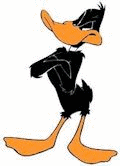Click here for versions in German and French
A wonderful game, works very well, and since it can be played with a standard deck of cards there is almost no time it can't be suggested when two players are ready to go. Ben Baldanza, Board Game News (now defunct).
It's a game which I've had fun playing at three in the morning and at three in the afternoon; it's not difficult to play and saying "quack-quack" "duck soup" is surprisingly fun. (Petar Djordjevic, Boardgamegeek)
There is a point

Poster for the classic
1933 film comedy
to this game, but I've forgotten what it is.
However, I am pleased to report the receipt of two entirely unsolicited
testimonials of appreciation. One, from a German card-player, reads:
"I've just came from a one-week-holiday were I
learned Duck soup and I enjoyed it a lot. Never thought a two-player
trick-taking game can work so well! I'm so excited that I started to
translate the rules of the rest of your games into German, so I can try
out more games with my friends (which dont speak english so well)."
The other one has gone missing, unfortunately, but the writer said he and
his partner had been playing it for a couple of years and still find it fun.
(Incidentally, for anyone not old enough to remember, "duck soup"
means "dead easy" - besides being something you call out when
a waiter goes berserk and starts throwing things around.)
For the four-player partnership version see Doubleduck, and, for three-players, Trebleduck.
- Cards
-
 52, ranking in their normal order, except that Ace counts low in the first
course (KQJ1098765432A) and high in the second (AKQJ1098765432).
52, ranking in their normal order, except that Ace counts low in the first
course (KQJ1098765432A) and high in the second (AKQJ1098765432). - Deal
- Each player deals in turn. Deal 13 cards each, one at a time, and stack the rest face down to form a stock.
- Object
- To win tricks, especially tricks containing cards of different soups. (Sorry - suits). The game is played in two courses. In the first course (Duck), both of you, after playing to a trick, draw the top card of stock to restore your hands to thirteen. In the second course (Soup), which begins when the stock runs out, you play your hands out to a finish. Tip: You'll find it more profitable to win a middling number of tricks in both courses than many in one course and few in the other.
- Play
-
 Non-dealer leads to the first trick and the winner of each trick
leads to the next. The follower may play any card. There is no need to follow
suit and there are no trumps.
Non-dealer leads to the first trick and the winner of each trick
leads to the next. The follower may play any card. There is no need to follow
suit and there are no trumps.
- In the first course (duck), the trick is taken by the lowest card of the suit led, and Ace counts low.
- In the second course (soup), the trick is taken by the highest card of the suit led, and Ace counts high.
- Quack!
-
Peculiar things
 happen when your opponent leads to a trick and
you play a card of the same rank as the one led (that is, an Ace to an
Ace, a Two to a Two, and so on). Whenever you do this, you are advised to say
'Quack!'. (Otherwise your opponent automatically wins the trick, which counts
double.) But if you do remember to quack, then the leader
must either -
happen when your opponent leads to a trick and
you play a card of the same rank as the one led (that is, an Ace to an
Ace, a Two to a Two, and so on). Whenever you do this, you are advised to say
'Quack!'. (Otherwise your opponent automatically wins the trick, which counts
double.) But if you do remember to quack, then the leader
must either -
- say "Duck", in which case you (the quacker) win the trick and store it face up, or
- play a third card of the same rank and say "Quack-quack". In this case you must play another card. If it is the fourth card of the same rank, you say 'Duck Soup' and win both tricks, storing them both face up. If it isn't, the leader wins both tricks, storing the first trick face up and the second trick either up or down depending on whether or not your last card followed suit to the third card played.
- Score
- At the end of the Duck course, as soon as the last card has been drawn from stock and before the next trick is led, you both note the scores you have made so far, counting one for each face-down trick and two for each face up. These tricks are then piled up to one side and must be kept separate from tricks won in the second course. Tricks won at the end of the Soup course are scored the same way. You each then calculate your final score for the whole deal by multiplying together your two scores for the individual courses. For example, if in the Duck course you took 6 tricks for 7 points, and in the Soup course you took 5 tricks for 8 points, your final score will be 7 x 8 = 56.
- Game
-
Play up to 250 points over as many deals as it takes. (Usually two.) The deal alternates.
- If you lose, and fail to reach 125 points in all, you are 'in the soup' and lose a double game.
- If you score 125 or more in a single deal, you are 'in the pond' and win a double game without further play.